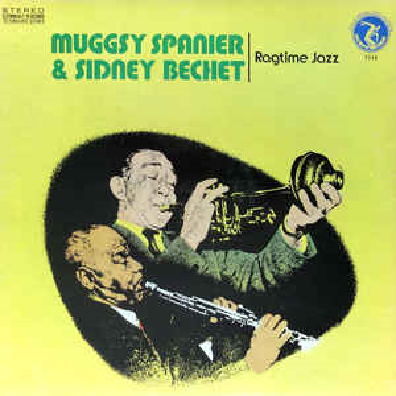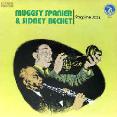
Editor, Webmaster: Phil Cartwright Editor@earlyjas.org
|
Sweet Lorraine, Lazy River, China Boy, Four or Five Times
That's A Plenty, Squeeze Me, Sweet Sue
If I Could Be With You (One Hour Tonight)
Sidney Bechet, clarinet, soprano sax; Muggsy Spanier, trumpet;
Carmen Mastren, guitar; Wellman Braud, bass
In one of those remarkable moments of cross pollination often experienced by musicians, but
rarely captured at the precise moment of brilliance in the recording studio, European Gypsy
Jazz once had a direct impact upon one of jazz history's founding fathers. The date was
March 28, 1940, the idea Stephen Smith's: to pair Bechet and Spanier with a gypsy rhythm
section (bass and guitar without drums) and see what happened when they were given the
opportunity to swing a la Django Reinhardt and the Hot Club de France (Chilton, 126). The
result was some of the most compelling recordings of any era, and certainly among the finest
of Bechet's stellar career.
For a clarinetist, one of the great advantages of Gypsy Jazz is the lower overall volume of
the group. Because there are no drums or piano, it's easier for the clarinet to project clearly,
without forcing, in any register of the instrument, at any dynamic level. Bechet takes
advantage of this, on both clarinet and soprano sax, switching back and forth sometimes in
the same tune. On "That's A Plenty" for example, he lays down what is certainly one of the
finest clarinet solos on the tune, then picks up his sax and gives a definitive saxophonic
interpretation.
One of the myths surrounding Bechet was that he more or less abandoned the clarinet
unless it was demanded by a trumpet player for a more "legitimate" revivalist purpose. Among
other things, these remarkable recordings demonstrate that Bechet used clarinet and
saxophone according to his vocal and timbral needs, and that the clarinet wasn't exactly
supplanted by the soprano sax. When he wants low chalumeau underlining, for instance, he
doesn't hesitate to use the clarinet on "Lazy River." The tunes are dominated by saxophone,
but nowhere else in Bechet's catalogue is it more clear that he chose based upon expressive
needs of each situation.
The titles listed above are, so far as I can tell, the only tunes recorded by the Bechet-Spanier
Big Four.
Work Cited:
Chilton, John. Sidney Bechet: The Wizard of Jazz, Oxford University Press, NY, 1987.
| Earlville Association for Ragtime Lovers Yearning for Jazz Advancement and Socialization |
EARLYJAS
The Sidney Bechet/Muggsy Spanier Big Four

